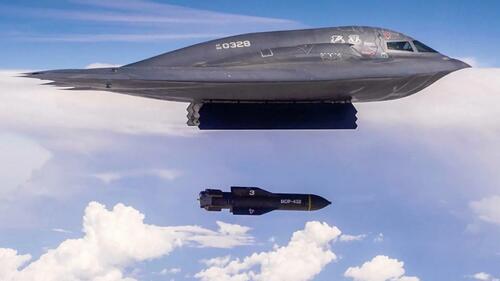Authored by Andrew Korybko via Substack,
It’s unrealistic to expect the US to maintain 500% tariffs on China and India for their purchase of Russian oil, which would also ruin its trade talks with them and derail the Ukrainian peace process…
Senator Lindsey Graham recently said that his bill to impose 500% tariffs on every country that imports Russian resources is “an economic bunker buster against China, India, and Russia”, yet for all his tough talk, the US is still reluctant to drop it. The Wall Street Journal reported that the Trump Administration is “quietly pressuring” the Senate to water down the legislation by “turn[ing] the word ‘shall’ into ‘may’ wherever it appears in the bill’s text, removing the mandatory nature of the prescribed reprimands”.
Their report was lent credence by Graham himself proposing an exemption for countries that aid Ukraine, thus averting an unprecedented US-EU trade war in the event that his bill passes into law. Trump’s remark to Politico in mid-June about how “sanctions cost us a lot of money” suggests that he’s not interested in going this route, with Secretary of State Marco Rubio later telling them that sanctions could derail the Ukrainian peace process, though he also didn’t rule them out in the future.
These are sensible explanations for the US’ reluctance to drop its “economic bunker buster” on Russia but they don’t account for its reluctance to drop it on China and India, which have served as invaluable valves for Russia from the West’s sanctions pressure due to their large-scale import of its oil. Graham expects that they’ll cut off their purchases if the US threatens them with 500% tariffs but they’re unlikely to comply since they know that the US would also harm its own economy through these means.
Not only that, but the trade deal that US and China recently agreed to would be jeopardized, as would the ongoing talks with India over a similar such agreement. Trump is pleased with both and doesn’t want to rock the boat right now. While he might revert back to his previous tariff pressure if things don’t go his way, he could just unilaterally impose more tariffs against either in that scenario, and they probably wouldn’t be anywhere near the counterproductive level that Graham’s legislation demands.
Seeing as how “The US Is Once Again Trying To Subordinate India”, which is part of his administration’s efforts to reshape South Asian geopolitics, he’s more prone to imposing higher tariffs against it instead of China but it’s premature to predict that he ultimately will. In any case, the pretext probably wouldn’t be energy-related given that he just surprisingly posted that “China can continue to purchase Oil from Iran” in spite of early February’s Executive Order that explicitly aims to “drive Iran’s export of oil to zero”.
It would therefore be utterly bizarre for Trump to impose tariffs of any level on India or whoever else for purchasing Russian resources when he now no longer cares about the US’ systemic rival China purchasing oil from none other than Iran, which he just bombed, in defiance of his own decree. The aforementioned calculations make it very unlikely that Trump will drop Graham’s “bunker buster” on either of those two. If his bill enters into law, a loophole would likely be found to avoid complying with it.
This prediction brings the analysis back around to the future of Graham’s “economic bunker buster”. Quite clearly, the Trump Administration doesn’t want him to move it through Congress so he might respect their wishes, thus leading to his bill becoming nothing but bluster. This is especially so if his team signals that it’s already found a loophole to get around it unless he changes the language as reportedly requested. China, India, and Russia therefore almost certainly have nothing to worry about.
Loading…


















